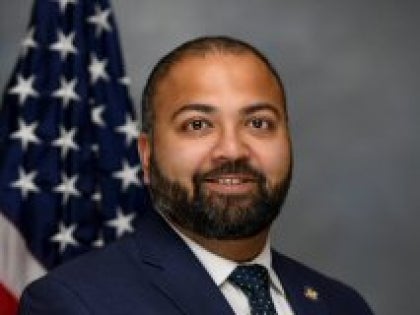
Senator Thomas FY2024 Budget Highlights: Affordability, Progress & Prosperity for Long Islanders
May 4, 2023
(NASSAU COUNTY, NY) – This week, Senator Kevin Thomas and the New York State Senate Democratic Majority passed the Fiscal Year 2024 New York State Budget, which upholds the values of affordability, progress, and prosperity for New Yorkers. The budget prioritizes crucial measures like fully funding public education; continuing the lowest personal income tax rates for working and middle-class families in over 70 years; bolstering economic development; furthering efforts to combat climate change; and improving healthcare access, which includes historic mental health funding. Expanding the Child Tax Credit, affordable childcare, and free school lunches in this budget will help families across New York State save money.
Senator Kevin Thomas said, “I came to Albany to fight for Long Island to get its fair share, and I’m proud that this budget delivers on numerous priorities that will boost Long Island businesses and protect local resources. This Budget reflects my commitment to improving the lives of Long Islanders by prioritizing affordability and economic opportunity. These investments are an important step towards a better future for all New Yorkers. We are dedicated to investing in our children by fully funding Foundation Aid, bringing more money to the suburbs for free Pre-K, and further expanding the Child Tax Credit and free school lunches to save families more money.
My constituents made their voices heard – and I listened. We successfully fought against proposed unfair burdens like the MTA Payroll Tax and mandatory housing requirements, and secured more funding to support distressed hospitals and build a new Belmont Park.”
Senator Thomas secured major wins for Nassau County that include:
- Omitting the proposed “Payroll Mobility Tax” for Long Island
- Funding the Universal School Meal Program to allow more students to get free school meals
- Bringing more money for Pre-K programs in the suburbs
- Increasing State aid to localities and school districts and fully funding Foundation Aid
- Scrapping mandatory housing requirements and overrides of local zoning.
- Rejecting tuition increases for CUNY/SUNY schools
- Minimum wage increases
- Clarifying judicial discretion with criminal justice reforms.
- Protecting our environment
- Increased funding to support distressed hospitals
- A $455 million loan to revitalize and expand Belmont Park to help boost our local economies
More details on FY 2024 enacted budget highlights below:
Strengthening Our Public Schools and Higher Education:
- Supporting New York’s K-12 Education: The New York Senate is fully funding Foundation Aid for public schools for the first time, and secured the largest annual School Aid allocation of $34.5 billion.
- Expanding Free School Meals: In a groundbreaking victory, the New York Senate won $135 million to cover school meals, helping ensure that no student goes hungry during the school day.
- Bolstering SUNY and CUNY: The Senate Democrats successfully halted any increases to in-state tuition across these higher ed systems, and procured increases in general operating aid for SUNY of $103 million and for CUNY of $53 million. Additionally, this budget secures $50 million for transformational initiatives at CUNY.
Investing in Transforming Our Transportation Infrastructure:
- Helping to save the Metropolitan Transit Authority (MTA): This budget adjusts the Payroll Mobility Tax on the largest businesses within New York City to 0.6%, generating approximately $1.1 billion annually for the MTA. This budget also appropriates $300 million in one-time State Aid, and requires New York City to contribute $165 million for paratransit services funding. Lastly, it reduces the proposed MTA fare increase so that services remain affordable to the everyday riders who rely on these services. In that effort, we will be expanding service frequencies on the subway and launching a pilot program providing five free bus routes in New York City to improve access across the Five Boroughs.
- Improving Rural Roadways: The Senate achieved $20 million in additional funds for Upstate STOA funding, for a total of $306.6 million, a 14.6 percent increase from last year. The Senate also won $60 million in capital funding for CHIPS for a total of $598 million, and $40 million in capital for State Touring Routes for a total of $140 million.
Expanding Access to Healthcare, Mental Health Treatment & Social Services:
- Standing Up as a Destination State for Reproductive Care: As federal attacks on reproductive freedoms continue, New York is allocating $100.7 million to fund abortion providers. This budget also expands access to abortion care for SUNY and CUNY students, as well as over-the-counter contraception. It also takes timely steps to protect the data of patients seeking reproductive care, and increases the Medicaid reimbursement rate specifically for abortion services.
- Investing in Mental Health: This year, New York will be making one of the largest investments in mental health in a generation, $1 billion for transforming the continuum of care by increasing inpatient psychiatric treatment capacity, dramatically expanding outpatient services, and boosting insurance coverage.
- Supporting New Yorkers with Disabilities: By expanding the Medicaid Buy-In Program for working people with disabilities, funding and reinvigorating the Interagency Coordinating Council for Services to Persons who are Deaf, Deaf-Blind and Hard of Hearing and increasing the number of Civil Service Section 55-B positions to grow the representation of those with disabilities in the state workforce we will be able to support some our most vulnerable population.
- Strengthening Distressed Providers: This budget allocates $500 million to support additional aid for distressed providers, casting a lifeline to the safety net hospitals that are often the last venues for care in underserved communities. This budget also reserves $35 million to support 340B funded entities.
- Revitalizing Medicaid: The 2023-2024 budget includes $1 billion in health care capital funding and expanded Medicaid coverage for more than 7.8 million low-income New Yorkers, including a significant rate increase of 7.5% for in-patient hospital services and 6.5% for out-patient hospital services, nursing homes, and other providers.
Boosting Funding to Spur Economic Development & Support Small Businesses:
- Helping Small Businesses Grow: This budget allocates over $12 million in Legislative Grants for businesses, including the creation of a matching grant program for the Small Business Innovation Research and Small Business Technology Transfer grant programs. It also includes language to create a new entrepreneurial training grant pilot program for entrepreneurs successfully finishing training at ESD's Entrepreneurship Assistance Centers and allocates $400,000 for the program.
- Supporting Minority and Women-Owned Business Enterprises: The New York Senate Democrats are continuing to support MWBEs by securing an additional $1.4 million for the MWBE Development Lending Program from the Executive Proposal, for a total of $2 million.
- The New York Film Tax Credit: In order to make New York a more competitive place to grow jobs and drive economic growth, New York will expand and enhance the New York Film Tax Credit which will provide a boost to New York's film industry, one of the largest union employers in the state.
- Boosting Demand for New York Food and Products: This budget includes $10 million to support the establishment of farm markets, supermarkets and food cooperatives in underserved communities; and $50 million over five years to local school districts to support New York State farm products in meals for K-12 school children
Supporting Working People and Families:
- Raising the Minimum Wage: The budget increases the state minimum wage by $2 over the next three years, after which it would increase at a rate determined by the Consumer Price Index for Urban Wage Earners and Clerical Workers (CPI-W), giving hundreds of thousands of New Yorkers who earn minimum wage a pay increase to keep with rising costs of living.
- Strengthening Child Care Resources: This budget implements new comprehensive programs to ensure high-quality, affordable child care, including $500 million towards a Workforce Retention Grant Program and $25 million to support the Employer Child Care Tax Credit.
- Expanding Child Tax Credit: This includes language that will make this tax credit available to families with children from ages zero to four. This will allow approximately 584,000 more households to claim the credit, benefitting 993,500 adults and 993,700 children in those households.
- Lower Personal Income Tax: This budget would continue a phase in of the lowest personal income tax rates for working and middle class families making it the lowest it has been in over 70 years.
- Wage increase for O-Agency Workers: This would increase the cost of living adjustments from the Executive’s proposed 2.5% to 4% for employees in OTDA, OPWDD, NYSOFA, OCFS, DOH and OMH.
Bolstering Investments in Public Safety:
- Securing Our Streets from Weapons of War: The New York Senate Democrats continue to fund evidence-based gun violence reduction programs, with this budget allocating $347 million to such initiatives.
- Strengthening the Enforcement Powers of the Office of Cannabis Management and Department of Taxation and Finance: In order to combat the rise in gray market cannabis shops and to further grow the legal marketplace for cannabis, the Budget increases the enforcement powers of OCM and DTF, including levying fines on illegal retail operations and closing those shops down.
- Combating Hate Crimes and Anti-AAPI Violence: New York State will be providing $30 million for Asian American Pacific Islander equity budget coalition priorities for crisis intervention initiatives and community based programs to combat hate crimes.
- Clarifying Procedures and Upholding Criminal Justice Reforms: This budget allocates $160 million to support the implementation of discovery reform for prosecutors and defenders, along with $50 million in capital for discovery technology improvements in New York City. It also provides for $92 million for aid for prosecution and defense funding throughout New York.
Increasing Housing Access for New York’s Families:
- Protecting Homeowners and Buyers: This budget secures $40 million for the Homeowner Protection Program, $25 million for a First-Time Homeowners Program, and $10 million for Land Banks.
- Supporting Affordable Housing: The Senate won the inclusion of $391 million in funding to cover Covid-era arrears for NYCHA, other public housing authorities, private tenants, and Section 8 tenants.
Combating Climate Change & Protecting the Environment:
- Improving the Climate Cap-and-Invest Program: This budget includes provisions to direct the spending of any proceeds from any emission reduction programs established by the state to ensure that consumers receive rebates and to make the state more resilient against climate risk.
- Implementing the All-Electric Buildings Act: The budget requires the Building and Energy codes to prohibit the installation of fossil-fuel equipment and building systems (any equipment or infrastructure excluding cooking equipment used for combustion or supply of fossil fuels) in new buildings starting December 31, 2025 for new buildings of seven stories or less, and December 31, 2028 for all new buildings regardless of size or building type.
- Strengthening the Build Public Renewables Act: This legislation empowers NYPA to direct, plan, build, and operate renewable energy projects to support the state in meeting generation targets in the CLCPA and the Climate Action Council’s Scoping plan. It also seeks to provide adequate and reliable supply of renewable energy and capacity in the state, and support the REACH program to give low and middle-income bill credits from the proceeds of Renewable Projects.
- Environmental Protection Fund: New York State has allocated $400 million for capital projects that protect the environment and enhance communities, including funding environmental justice, municipal parks and recycling, and land acquisition.
- Clean Water Infrastructure: The state budget includes $500 million for the Clean Water and Infrastructure Act.
- Lead Paint Registry: This requires the Department of Health to coordinate with the Division of Housing and Community Renewal on the establishment of the registry, requires an audit of at least 10% of homes in the registry, permits homeowners to self-certify on the status of lead inspection, makes violations subject to enforcement actions within public health law, requires DOH to set standards for inspectors, and establishes a program sunset after three years.
##
